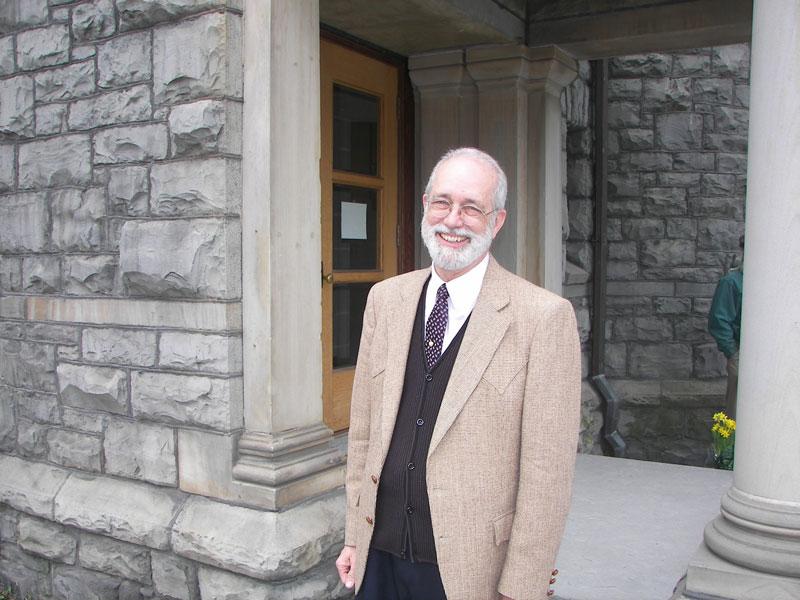
Ryan Sharpstene
“It’s a natural right for two people to decide to commit themselves to each other and be married,” said the Rev. David Grimm, minister of the First Unitarian Society of Ithaca. “Obviously the ideal situation would be for the Supreme Court to rule DOMA as unconstitutional, so that marriage equality exists in this country.”
Since 1973, the Unitarian Universalist Association, of which Grimm’s church is a congregation, has been publicly committed to marriage equality for lesbian, gay, bisexual and transgender (LGBT) couples.
“A family is a family no matter which gender is involved,” Grimm said. “When I hear people criticize same-sex marriage as ‘it’s not a real family’ and ‘it’s not good for the children,’ I don’t know where that idea comes from. All I have seen is the same sort of loving family.”
With polling data showing national public support for same-sex marriage nearly doubling since 1996 from 27 to 51 percent in 2013, the court heard arguments on March 26 for and against Prop 8, the controversial 2008 California ballot initiative that banned same-sex marriages within the state’s constitution. The following day, justices heard arguments pertaining to DOMA, a 1996 law signed by President Clinton that restricted federal marriage benefits to heterosexual couples.
[swfobject]1213[/swfobject]
Norman Dorsen, professor of constitutional law and civil liberties at New York University Law School, said he expects the court to rule DOMA unconstitutional.
“I think that they will declare DOMA invalid,” he said. “I don’t know how they will write the opinion, but I think there are five votes to do that – maybe even six.”
If DOMA were ruled unconstitutional, marriage benefits for LGBT couples in states which have legalized same-sex marriage, including New York and eight other states, as well as the District of Columbia, would have to be recognized by the federal government.
However, Dorsen said he is less sure of a definitive ruling on Proposition 8.
“They will not decide the California Proposition 8 case,” he said. “They will dismiss it on jurisdictional grounds.”
Most Catholic, Southern Baptist, Mormon, Presbyterian and other conservative churches remain adamantly opposed to same-sex marriage.
“The Catholic Church is against same-sex marriage,” said Father Jeff Tunnicliff, pastor of the Immaculate Conception Catholic Church.
“God made women and man to complement each other,” Tunnicliff said. “Two males or two females don’t complement each other in that way. It’s the way God meant for things to be.”
The legal civil union of marriage should have no overlap with the religious sacrament of marriage said the Rev. Brother Shawn Francis Benedict of the Ray of Hope Church.
“This is a question of equal protection under the law, and that is where it should rest,” Benedict said. “It shouldn’t have to do with anyone’s theology, anyone’s spirituality.”
Founded in Syracuse in 1983, the Ray of Hope Church has overtly supported and advocated marriage equality in its core doctrine.
“We’ve known since the late 1800s that not one of the verses in the Bible that are portrayed as being against homosexuality have actually anything to do with homosexuality,” he said. “The problem for me is knowing that other professional clergy have known this for years and it is no different than politics. They let the tail wag the dog.”
Benedict also noted the evolving positions in many Baptist, Episcopalian, Lutheran and Methodist churches, which often create tensions between official and local opinions.
“This congregation has tried to be as open, welcoming and affirming as it can be and to make sure that gay people know that this is a place of refuge and sanctuary,” said the Rev. John McNeill of St. Paul’s United Methodist Church, despite the national organization’s opposition to same-sex marriage.
“Because the United Methodist Church does not permit same-sex weddings, St. Paul’s is in a difficult position,” McNeill said. “We are trying to find a way to go forward that will allow us to be fully inclusive.”
“I’ve heard people in very conservative Christian churches say that homosexuality is a sin,” Grimm said, recalling conversations with his mother who, as a Southern Baptist, supported Prop 8.
“Yet, God created them that way?” Grimm said. “So what kind of a God is that, who would create somebody some way, but then condemn them for being that way?”
The court is expected to release their rulings on Prop 8 and DOMA in June.